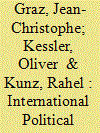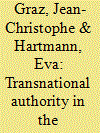|
|
|
Sort Order |
|
|
|
Items / Page
|
|
|
|
|
|
|
| Srl | Item |
| 1 |
ID:
169782


|
|
|
|
|
| Summary/Abstract |
This forum opens a debate that is long overdue: for far too long, the fields of international political sociology (IPS) and international political economy (IPE) have been standing apart. Discussions take place in different conference sections, in different networks that publish in different journals. Yet, this divide is surprising given that the two fields share similar trajectories, theoretical concerns, problématiques, and conceptual challenges. This forum starts exploring this shared terrain: we believe that there is no a priori reason to separate the sociocultural, the political and the economic when we aim at making sense of the world in any meaningful way. We propose that bridging the IPE-IPS divide has tremendous potential for the development of a socio-political economy analysis that, we believe, has two benefits. First, it allows for the opening of new empirical terrains or deepening and widening existing ones. Second, bringing IPE/S back together creates reflexive spaces for more holistic, embodied and contextualised conceptual innovation. The contributors to this forum show each in their own way such empirical and conceptual added value of moving beyond the IPE and IPS divide in order to develop what we call here a socio-political economy of the globe. They focus on various issues, such as the transformation of capitalism from an oil- to a data-dependent accumulation regime with the rising of the so-called ‘digital age’ (Chenou); the profound social, economic and political transformation triggered by urbanisation in the development world (Elias, Rethel and Tilley); emerging global risks and the neglected role of the insurance industry (Lobo-Guerrero); regional development-security nexuses (Lopez Lucia); and business power in climate change diplomacy (Moussu).
|
|
|
|
|
|
|
|
|
|
|
|
|
|
|
|
| 2 |
ID:
118135


|
|
|
|
|
| Publication |
2012.
|
| Summary/Abstract |
This article examines the extent and limits of nonstate forms of authority in international relations. It analyzes how the information and communication technology (ICT) infrastructure for the tradability of services in a global knowledge-based economy relies on informal regulatory practices for the adjustment of ICT-related skills. By focusing on the challenge that highly volatile and short-lived cycles of demands for this type of knowledge pose for ensuring the right qualification of the labor force, the article explores how companies and associations provide training and certification programs as part of a growing market for educational services setting their own standards. The existing literature on non-conventional forms of authority in the global political economy has emphasized that the consent of actors, subject to informal rules and some form of state support, remains crucial for the effectiveness of those new forms of power. However, analyses based on a limited sample of actors tend toward a narrow understanding of the issues concerned and fail to fully explore the differentiated space in which nonstate authority is emerging. This article develops a three-dimensional analytical framework that brings together the scope of the issues involved, the range of nonstate actors concerned, and the spatial scope of their authority. The empirical findings highlight the limits of these new forms of nonstate authority and shed light on the role of the state and international governmental organizations in this new context.
|
|
|
|
|
|
|
|
|
|
|
|
|
|
|
|
|
|
|
|
|